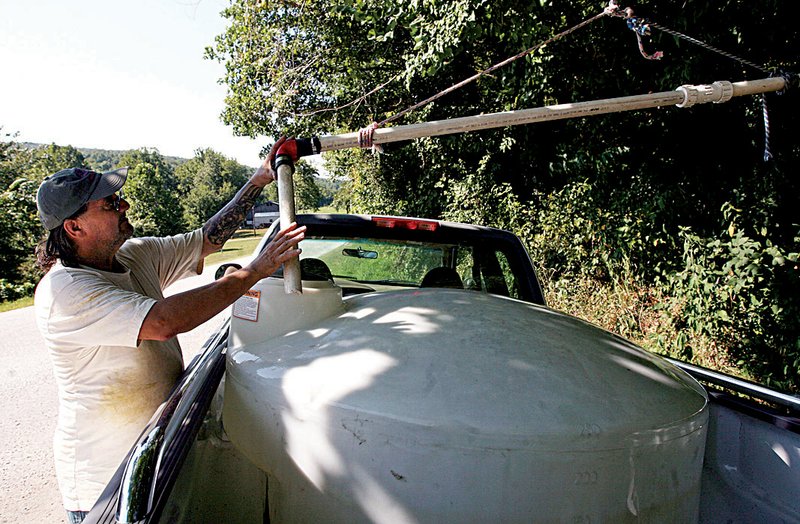LITTLE ROCK — Potable water is coming to the remote southeast corner of Washington County.
Installation of a $9 million system that will serve as many as 400 households will begin next year. Sponsored by the Washington County Rural Development Authority, the Southeast Water Project is being funded by the U.S Department of Agriculture, the Arkansas Natural Resources Commission, and the Reinvestment and Recovery Act of 2009.
Once complete, the entire county, with the exception of a few isolated pockets, will be served by running water.
“Many of these families in southeast Washington County have been hauling water for years to provide for their basic needs,” County Judge Marilyn Edwards said. “We are thrilled that they will finally have access to clean, safe, affordable drinking water.”
Many residents east of Winslow use Tatum Spring, which tested positive for the bacteria E. coli as recently as November 2009, as their water supply.
A plastic pipe connected to a stone basin at the bottom of a mountain carries the spring water out to the shoulder of Arkansas 74, where residents fill storage tanks and plastic jugs. Even with a new water system on the way, use of Tatum Spring, which is not regulated by the Arkansas Department of Health, likely will not stop in the near future.
County officials said the new system will take about two years to build, and residents cannot hook into the lines until the pipes have been cleaned, flushed and inspected.
While the promise of water lines sounds good to the rural residents, skepticism remains.
“We’ve heard it before,” said Clifford Burton, who has lived on Sunset Road for 15 years. “I won’t believe it until I see someone asking me for an easement.”
Tatum Spring, on the other hand, is an established water source that supplements private wells, many of which can’t support a household.
While Burton said he uses bottled water for drinking and cooking, he frequently goes to the springs to collect water for general household use. He even bought a one-ton pickup so he could haul water up the perilously steep incline on his way back from the springs.
“It’s a lot of work,” he said.
Meanwhile, the county is preparing easements, and sometime later this year expects to start enrolling households, said Wayne Blankenship, grant administrator for Washington County. Blankenship said the project could be bid before year’s end.
The program includes 75 miles of pipe, a 300,000-gallon storage tank and a pump station. The new system will serve at least 300 households, and up to 400 if enough households enroll.
The project has been in the works since the early 1990s, when residents from the Whitehouse community asked the county for water.
Enrollees must pay $475 to tap into the system, and pay for the pipes needed to carry the water from the mainline to the home.
A ceremony announcing the program is scheduled for 9:30 a.m. today at the Washington County Courthouse at 280 College Ave. in Fayetteville.
Blankenship said he understands why residents are skeptical: They’ve been hearing about and waiting for water for 20 years. That’s why the county scheduled the ceremony, which is supposed to be attended by dignitaries including U.S. Sen. Blanche Lincoln, D-Ark.
The positive E. coli sample from Tatum Spring dates to Nov. 4, 2009. The sample was taken by the Washington Water Authority and submitted to the state Health Department for testing. The water authority took the sample as part of its program to periodically test unregulated sources of water.
Most strains of E. coli are harmless, while others can cause diarrhea, urinary tract infections, respiratory illness and pneumonia, according to the Centers for Disease Control and Prevention.
That Tatum Spring tested positive less than a year ago speaks loud and clear to Josh Moore, general manager of Washington Water Authority.
“That’s not a safe source of drinking water,” he said.
The Health Department said much the same thing.
“Tatum Springs is not a public water system, nor does it supply any currently regulated public water system,” said Linda Thompson, a department spokesman. “The Arkansas Department of Health would not recommend the consumption of water from any spring without proper treatment and analysis of the water to assure its safety. The [Health Department] recommends people avoid consumption of water from unregulated sources.”
John Swanner, who has used Tatum Spring for five years, said he’s not worried about getting sick. His 1,500-gallon home system filters and chlorinates the water before it comes out of the tap.
Swanner, who doesn’t have a well, hauls water once or twice a week, and routinely cleans out the filtration system.
Like Burton, he’s not convinced the new lines will be installed. “We’ve been hearing about it since before my time,” he said.
He said he doesn’t mind hauling from Tatum Spring.
“But [running] water would be nice,” he said.
Arkansas, Pages 9 on 08/09/2010
